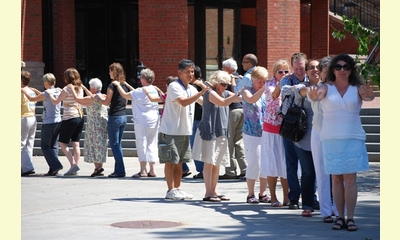|
|
National Peace Academy Holds Second Summer Intensive for Community Peacebuilders
un article par Dot Maver
Over 50 participants from 15 US states and 6 countries in Africa and Asia convened on Champlain College campus in Burlington, Vermont in July for the National Peace Academy's 2011 Peacebuilding Peacelearning Intensive. Led by 15 faculty speakers and facilitators, the NPA Intensive's week long program helped practitioners develop programs for safe, healthy and sustainable communities free from violence. Vermont's own Amy L. Seidl, PhD author of Early Spring: An Ecologist and Her Children Wake to a Warming World, and Finding Higher Ground: Adaptation in the Age of Warming and ( Bill McKibben presented a plenary session at the NPA's Peacebuilding Peacelearning Intensive. She shared, "PPI has given me a great gift: it showed me that mitigating and adapting to climate change is, in the large stand most powerful sense, about bringing peace into our lives." 
The trust train
click on photo to enlarge
National Peace Academy President and Burlington resident Dot Maver said, "We want to thank the 29 local businesses who supported PPI 2011, and based on the overwhelmingly affirmative response from Intensive participants, we at the National Peace Academy are eager to offer several new courses through our National Peacebuilding Peacelearning Certificate Program to support the ongoing development of the skills, capacities, and knowledge Americans are calling for to create positive change in their communities."
Recently featured in a Christian Science Monitor editorial on peacebuilding institutions ,"The nonprofit National Peace Academy in Shelburne, Vt., is one such institution, building the skills for the professional peacemaker in every aspect of life, be it at the personal, social, political, institutional, or ecological level." With the support and assistance of National Peace Academy edulearner faculty, each participant worked throughout the week on the design and development of a strategic peacebuilding project to bring back to his or her community or organization. National Peace Academy faculty will follow up with participants to assist as needed with project implementation and impact evaluation.
Concerned citizens from all walks of life came to Burlington," said Tony Jenkins, National Peace Academy Director of Education, "and returned home with concrete ideas for bringing sustainable change to their organizations and local communities. I see this commitment as evidence that peace, hope, and change are not just slogans but real practical possibilities."
Visit nationalpeaceacademy.us for more information on the National Peace Academy and its future programs.
|








|
DISCUSSION
Question(s) liée(s) à cet article:
Does research show that nonviolence works?,
* * * * *
Commentaire le plus récent:
Did the writings on nonviolence by Gene Sharp help inspire the movements of the Arab Spring in Egypt and elsewhere?
This is debatable. The New York Times said "yes" and some Egyptians, for example, the blogger Karim Alrawi say "no".
However, it should be recognized that the ideas of nonviolent resistance have a way of transcending borders and centuries. Nelson Mandela was influenced by Martin Luther King who was influenced in turn by Mahatma Gandhi who was influenced in turn by Henry David Thoreau.
[Note added later: The blog of Karim Alrawi is no longer available on the Internet, but see instead the blog of Hossam El-Hamalawy who says that the Palestinians "have been the major source of inspiration, not Gene Sharp, whose name I first heard in my life only in February after we toppled Mubarak already and whom the clueless NYT moronically gives credit for our uprising."

|
|









